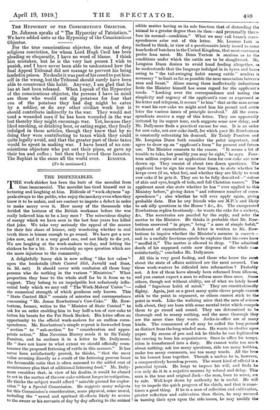TT appears that the Kaiser, in his vulgar arrogance, -I-
could not contrive even verbal originality. A corre- spondent who has as good a right to speak for the British soldier as any man in the land sends me the following, from that treasure-house of gay and gallant mysticism, the Religio Medici :- " This makes me naturally love a soldier and honour those ragged and contemptible regiments that will die at the command of a Sergeant."
Thus did Browne prediscover the men of Mons. But it may be remembered that the noble physician was as much moved by the Navy as by the Army. Is there not his delightful letter to his son who became a sailor, reminding him that when he first determined to go to sea, he (Sir Thomas) insisted on his studying all the naval actions in Plutarch ? He was evidently determined that the classics should be useful as well as ornamental.
" IN WOODS AND QUIET PLACES BY RIVERS."
Will some one tell use where the following delightful sentences quoted in the Preface to the original Guesses at Truth, by Alugustus and Julius Hare, are to be found ?— " Remember what the old author says, that even to such an one as I am, an idiota or common person, no great things, melancholising in woods and quiet places by rivers, the Goddess herself, Truth, has oftentimes appeared.' " Who is the " old author " ? I presume Burton, the Anatomist of Melancholy. But though Burton's Anatomy is said to be the only book that Johnson ever read twice (unless this distinction belongs to Lady Mary Wortley Montagu's letters), and the only book that got him out of bed two hours sooner than he wished to rise, I cannot undertake to go through Burton in order to find the passage. There is no concordance. But that is no great matter. The readers of the Spectator reek not of such trifles, and I shall soon have chapter and verse, if not from London, then from Canton or Nigeria or some island lapped by the waves of the Spectator. It is the Outlanders now who read the great books.
• I analogize to the shades of two eloqeent rletorlows THE HYTOCELSY OF THE CONSCIENTIOUS OBJECTOR.
Dr. Johnson speaks of " The Hypocrisy of Patriotism." We have added unto us the Hypocrisy of the Conscientious Objector.
For the true conscientious objector, the man of deep religious conviction, for whom Lord Hugh Cecil has been pleading so eloquently, I have no word of blame. I think him mistaken, but he is the very last person I wish to punish, and I have never been able to understand how the final Appeal Tribunal did not manage to prevent his being landed in prison. No doubt it was part of his creed to put him- self in the wrong, but the Tribunal should surely have been able to counteract this habit. Anyway, I am glad that he has at last been released. When I speak of the Hypocrisy of the conscientious objector, the persons I have in mind are those who would not dig potatoes for fear that one of the potatoes they had dug might be eaten by a soldier, or do any other civilian work lest it should contribute indirectly to the war. They would not tend a wounded man if he has been wounded in the war lest thereby they might encourage war. Yet, because they liked smoking, or drinking beer, or eating sugar, they freely indulged in these articles, though they knew that by so doing they were contributing to taxes which they could quite legally avoid, and that the greater part of these taxes would be spent in making war. I have heard of no con- scientious objectors who put out their pipes, or gave up their tea and coffee ; but then they loved these luxuries. The Sophist is the same all the world over. luNorus.
(To be continued.)



































 Previous page
Previous page